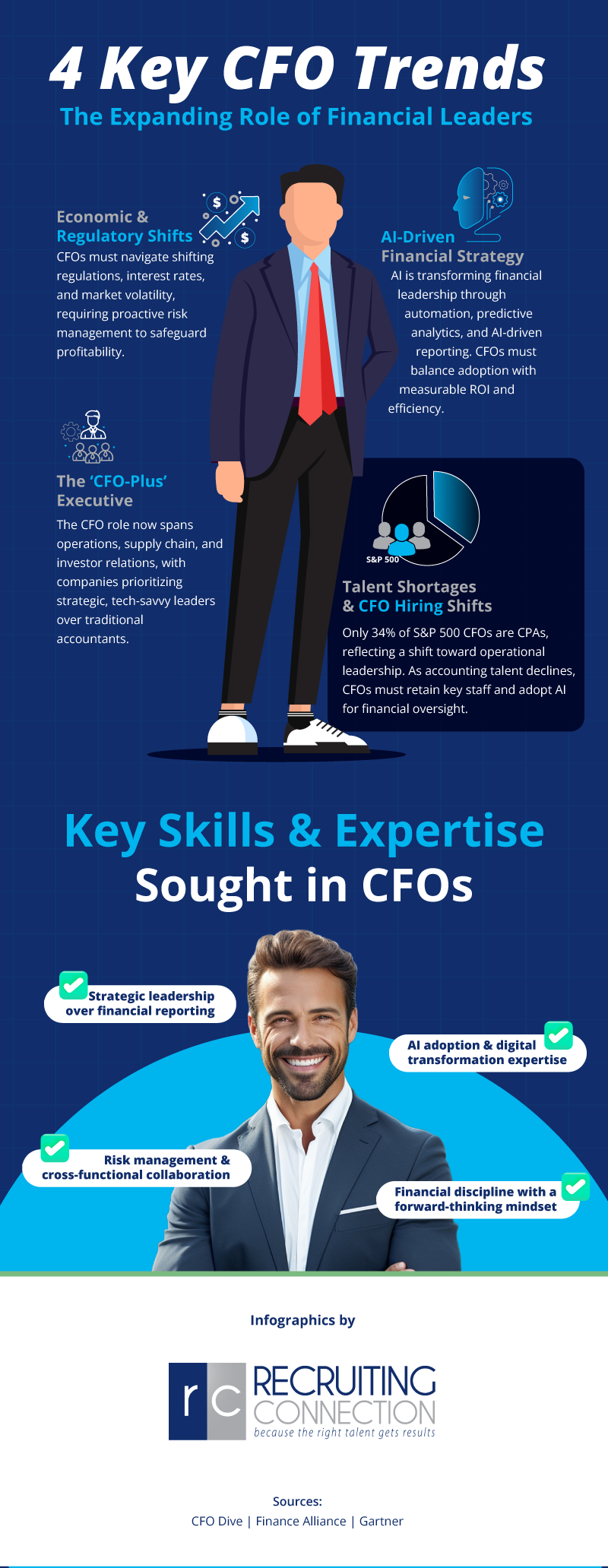CFO Hiring: What’s Changing in Financial Leadership? (2025)
The CFO role isn’t what it used to be. Financial leadership has gone beyond balance sheets and budgeting—companies today need CFOs who can navigate digital transformation, drive strategy, and mitigate risks in a volatile market. CFO hiring trends reflect this shift, with businesses prioritizing candidates who blend financial expertise with data-driven decision-making and operational foresight.
As the economy, technology, and regulatory landscapes evolve, so do the expectations for CFOs. The latest CFO statistics highlight these shifting demands, emphasizing the need for leaders who can adapt to emerging financial trends and technological advancements.
Whether you’re planning a CFO search or refining your recruitment strategy, understanding these shifts can help you attract top talent equipped for the future. Here’s what’s changing in CFO leadership and what it means for your organization.
CFO Trends in 2025: The Expanding Role of Financial Leaders
The CFO position is evolving rapidly, shifting beyond traditional financial oversight to encompass broader strategic and operational leadership. Financial executives must balance fiscal responsibility with innovation. This transformation reflects emerging CFO trends that are reshaping the landscape of financial leadership.

Navigating regulatory shifts and economic uncertainty
Today’s CFOs are operating in an environment shaped by evolving financial regulations, interest rate fluctuations, and potential trade disruptions. With proposed tariff increases and shifting SEC oversight, CFO leadership now requires proactive risk management and scenario planning to safeguard profitability.
Additionally, Federal Reserve policy changes add another layer of complexity, requiring financial leaders to adapt to potential inflationary pressures and capital market volatility.
AI-driven decision-making and operational strategy
AI adoption continues to be a defining factor in CFO thought leadership as companies invest in automation, predictive analytics, and AI-powered financial reporting tools. However, finance leaders must ensure that AI implementation aligns with measurable ROI, addressing concerns over inefficiencies and integration challenges.
The rise of AI-driven financial management underscores the need for CFOs to be both data-savvy and strategic in their approach to digital transformation.

The rise of the ‘CFO-plus’ executive
The demand for CFO recruitment has expanded beyond traditional accounting and financial expertise. Companies are increasingly seeking leaders with operational and strategic experience—often referred to as “CFO-plus” executives.
These professionals are expected to oversee areas like supply chain management, technology integration, and investor relations, demonstrating the growing influence of financial executives in broader business decision-making.
Talent shortages and the future of CFO hiring
Another pressing concern in CFO search and CFO hiring is the ongoing shortage of qualified finance professionals. Fewer CFOs now come from traditional accounting backgrounds, with the percentage of CPAs in top financial roles steadily declining.
To adapt, organizations are diversifying their hiring criteria, prioritizing strategic leadership skills alongside technical and financial expertise. This shift reflects the growing emphasis on CFO thought leadership, where executives must guide companies through transformation rather than focusing solely on financial reporting.
As companies expand their CFO search beyond traditional accounting backgrounds, securing the right leadership requires a strategic approach. Leading finance recruiters help organizations identify CFOs who blend financial expertise with strategic vision and operational agility. With a deep understanding of today’s evolving CFO landscape, Recruiting Connection ensures you find the right executive to drive long-term success.
Skills and Expertise Companies Seek in Today’s CFOs
The expectations for CFO leadership have evolved beyond traditional financial management. Companies are seeking financial executives who can drive business strategy, manage digital transformation, and navigate an increasingly complex regulatory and economic landscape.

1. Strategic leadership over traditional accounting
The CFO search process has shifted significantly in recent years, with a growing preference for candidates who bring operational experience and strategic acumen rather than solely an accounting background.
While CPA certification was once a standard requirement, its importance has diminished as CFOs take on broader leadership roles beyond financial reporting. Instead, companies prioritize executives with a deep understanding of market dynamics, risk management, and cross-functional collaboration.
2. AI adoption and digital transformation
The rise of AI in finance has placed new demands on CFO thought leadership. CFOs must not only oversee AI adoption but also ensure that automation and predictive analytics deliver tangible financial benefits.
Poorly implemented AI strategies can create inefficiencies rather than resolve them, making it essential for CFOs to lead with a data-driven approach while maintaining financial discipline. Those who can effectively integrate AI into operations while balancing risk and return will stand out in the competitive CFO recruitment landscape.
3. Navigating an accountant shortage and financial reporting challenges
An emerging challenge in financial leadership is the growing shortage of accountants, which has direct implications for financial reporting accuracy and compliance. This shift is reflected in executive hiring trends—only 34% of CFOs at S&P 500 companies hold CPA certifications, and this number continues to decline as companies prioritize strategic and operational expertise over traditional accounting backgrounds.
At the same time, global spending on information technology is expected to increase by 9.3% in 2025, reaching $5.74 trillion, largely fueled by AI adoption. As AI and automation reshape financial operations, CFOs must ensure that these investments drive efficiency without compromising financial oversight.
Additionally, with fewer professionals entering the accounting field, CFOs must implement retention strategies and leverage technology to maintain financial reporting integrity.

What Companies Must Prioritize When Hiring a CFO
Organizations must rethink their CFO hiring strategies to secure executives who can navigate today’s fast-changing business landscape. The modern CFO is no longer just responsible for financial oversight but plays a key role in driving digital transformation, optimizing capital allocation, and influencing long-term strategy.
Key factors to assess in today’s CFO search
Companies must look beyond traditional finance expertise and prioritize candidates who excel in:
1. Strategic adaptability
With economic volatility, shifting regulations, and rapid technological advancements, CFOs must be agile decision-makers. They should demonstrate experience in risk management, scenario planning, and proactive financial restructuring to ensure resilience in uncertain conditions.
2. Technology fluency
The integration of AI, automation, and advanced analytics is reshaping financial strategy. C-suite expectations for AI-driven ROI have shifted, with executives now prioritizing higher revenue over productivity gains. A modern CFO must be proficient in AI-driven forecasting, predictive analytics, and ERP system optimizations to enhance decision-making and operational efficiency.
But as AI reshapes industries, the ability to align AI investments with financial strategy rather than speculative hype is critical—especially with a $600 billion gap between AI spending and the revenue needed to justify it.
3. Cross-functional leadership
A CFO today is not just a financial steward but also a business leader. Strong candidates should have experience collaborating with IT, HR, and operations teams to align financial strategy with broader organizational goals.

Red flags that signal a weak CFO fit
A CFO search must also identify warning signs that indicate a candidate may struggle to meet modern demands:
1. A transactional mindset
Candidates who focus solely on financial reporting and cost-cutting may lack the vision required for strategic financial leadership today. Organizations need CFOs who can balance cost efficiency with innovation-driven growth opportunities.
2. Resistance to digital tools
AI is expected to impact at least 80% of jobs, streamlining up to 50% of tasks for some roles, including finance professionals. CFOs must embrace AI-driven financial modeling, cloud-based accounting, and real-time analytics to stay competitive.
However, they must also proactively manage workforce concerns—ensuring employees understand AI’s role in enhancing efficiency rather than simply eliminating jobs. Fostering an AI-savvy culture where teams feel empowered rather than threatened will be key to a smooth digital transition.
3. Limited stakeholder engagement
CFOs interact with boards, investors, and executive teams, making strong communication and influence critical. A candidate who struggles to articulate financial strategies in a compelling, data-driven manner may not be suited for the role.
Finding a CFO thought leader
To ensure a strong hire, companies should go beyond standard resume reviews and implement the following:
1. Scenario-based assessments
Presenting real-world financial challenges, such as managing cash flow during economic downturns or integrating AI-powered financial forecasting, helps assess problem-solving and decision-making skills.
2. Discussions on CFO trends and digital transformation
Candidates should have informed perspectives on AI adoption, sustainability reporting, and the role of finance in strategic planning.
3. Leadership and cultural fit evaluations
A CFO must align with organizational strategy, foster innovation, and drive a high-performance financial culture while navigating the evolving financial landscape with confidence.

CFO Excellence in a Changing World
Finding the right CFO is about securing a leader who can navigate digital transformation, drive business strategy, and adapt to a rapidly shifting economic landscape. Companies that take a forward-thinking approach to CFO hiring will be best positioned to thrive in an increasingly complex business environment.
The best executive recruiters specialize in identifying top-tier financial executives who align with your company’s strategic goals. As one of the leading recruiting firms in Salt Lake City, Recruiting Connection helps businesses find dynamic CFO candidates who bring both financial acumen and visionary leadership.
From expertise in digital finance to risk management or operational strategy, our finance and accounting recruiters can help you secure the right executive talent. Partner with us today to build a leadership team that drives lasting success.

Struggling to find top
talent for your business?
Connect with the expertes at Recruiting Connection and discover the difference our full-service recruitment can make.
Contact Us Today
















